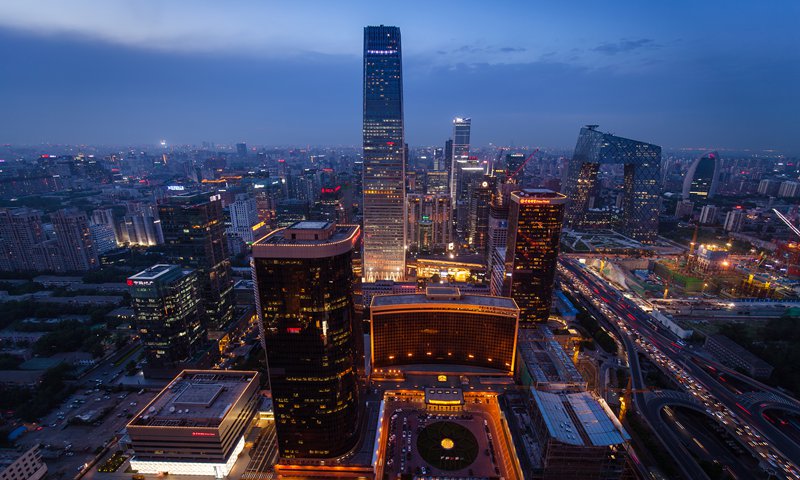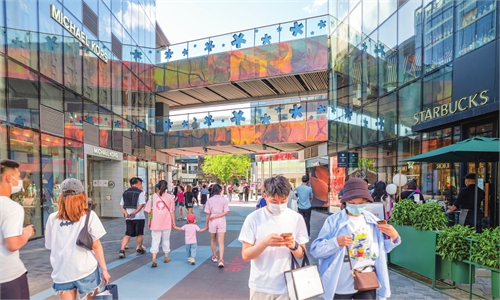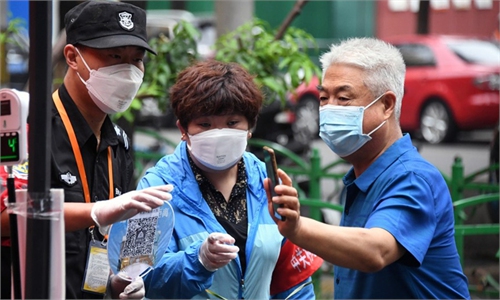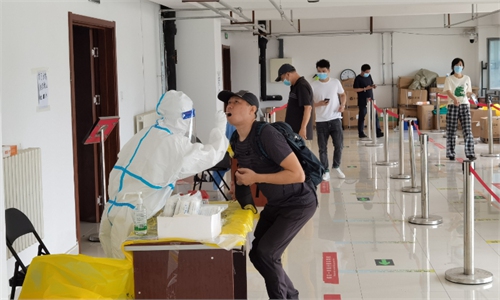
A night view of Guomao, an area at the center of Beijing’s CBD Photo: VCG
The Beijing Municipal Government rolled out a comprehensive set of policies in a bid to pull the city's consumption sector out of shadows of the recent COVID-19 outbreak, including issuing consumption coupons and encouraging companies to launch ecommerce promotions.
The measures reflect Beijing's distinctive approach of stimulating industrial upgrading through consumer spending, as economic "sticky points" still lie mostly in the production sector, experts told the Global Times.
Recently, eight government departments in Beijing issued a round of 27 measures to relieve challenges faced by business and stimulate consumption to speed up the city’s recovery.
Dai Ying, deputy director of the Beijing Municipal Commission of Development and Reform, said on Thursday morning that the city is committed to implementing a round of precise, efficient, feasible and pragmatic measures to help companies boost development and better meet people's consumption needs, according to the Beijing Daily in an article on Thursday.
The measures cover a wide range of sectors, ranging from dining and tourism to auto sales. For instance, Beijing will issue 100 million yuan ($14.9 million) worth of dining consumption coupons through a range of channels in July to lift recovery of the local catering sector.
The city will also direct platforms to issue consumption coupons in areas like convenience stores and hair salons to stimulate a strong community-level rebound.
According to a report of the National Business Daily on Monday, China's major 10 consumption centers, including Shanghai, Beijing and Guangzhou, have collectively issued nearly 7 billion yuan of consumption coupons since April.
Experts noted that Beijing's stimulus measures reflected a somewhat distinctive policy direction of pushing industrial upgrading via consumer spending, as the city has rolled out many policies to stimulate consumption of products related to China's emerging industries like new-energy vehicles (NEV) or other areas of the green economy.
"The Beijing's consumption-boosting policies are more precise, as they reflect an emphasis on driving up industries through market mechanisms," Hu Qimu, chief researcher at the Sinosteel Economic Research Institute, told the Global Times on Thursday.
For example, Beijing will provide subsidies of no more than 10,000 yuan to each NEV car purchased by local residents who comply with certain rules. The city will also encourage consumers to scrap or transfer traditional fossil-fueled cars and purchase NEVs.
The city's measures also reflect a trend toward online industries, supporting companies to expand "internet plus" business models, and announced a bonus of no more than 20 million yuan for companies that contribute greatly to online spending.
According to Hu, policies that help stimulate consumption of products like NEVs could drive up the entire value chain for NEVs, while helping to stimulate tech-heavy industries like energy storage.



